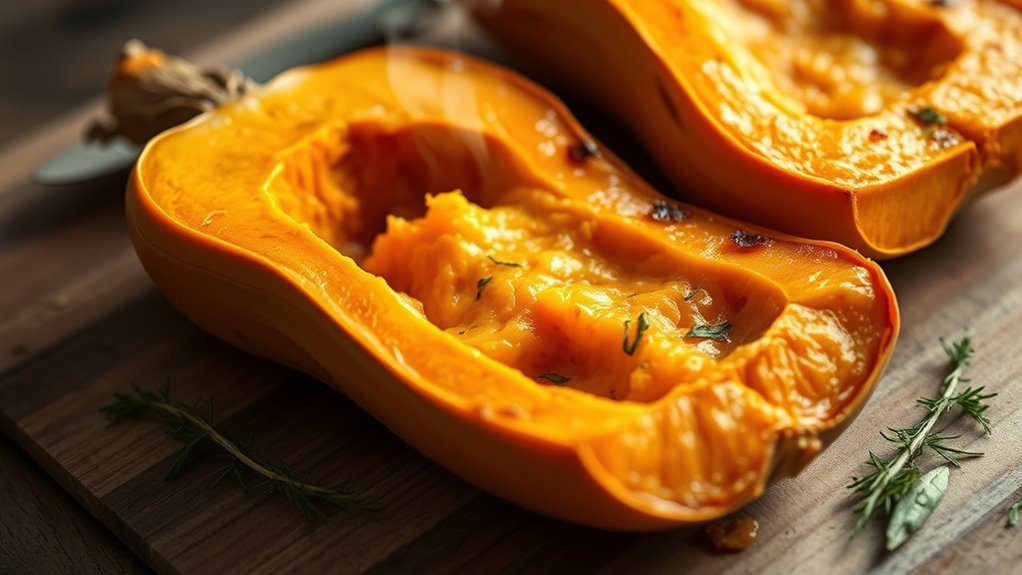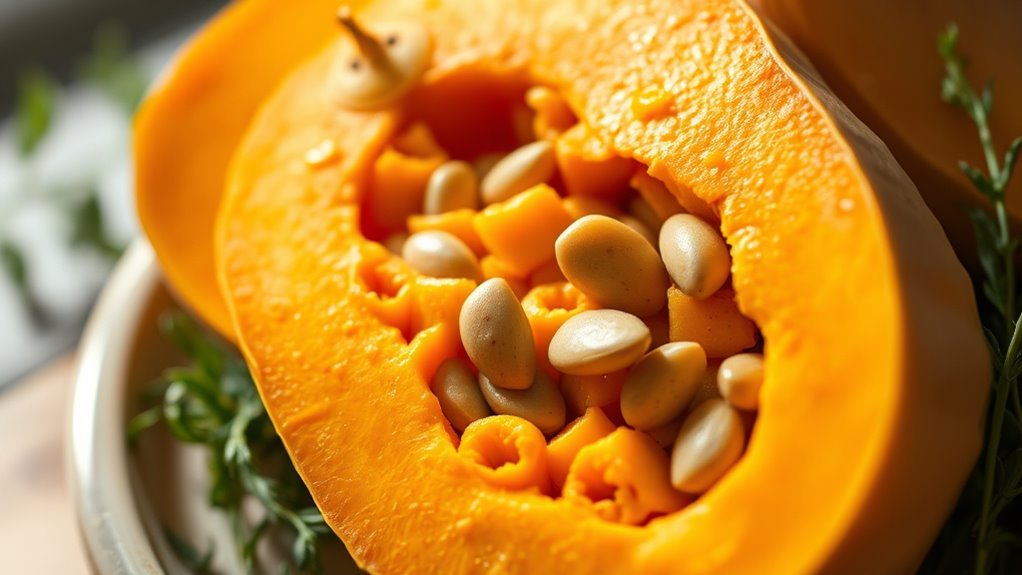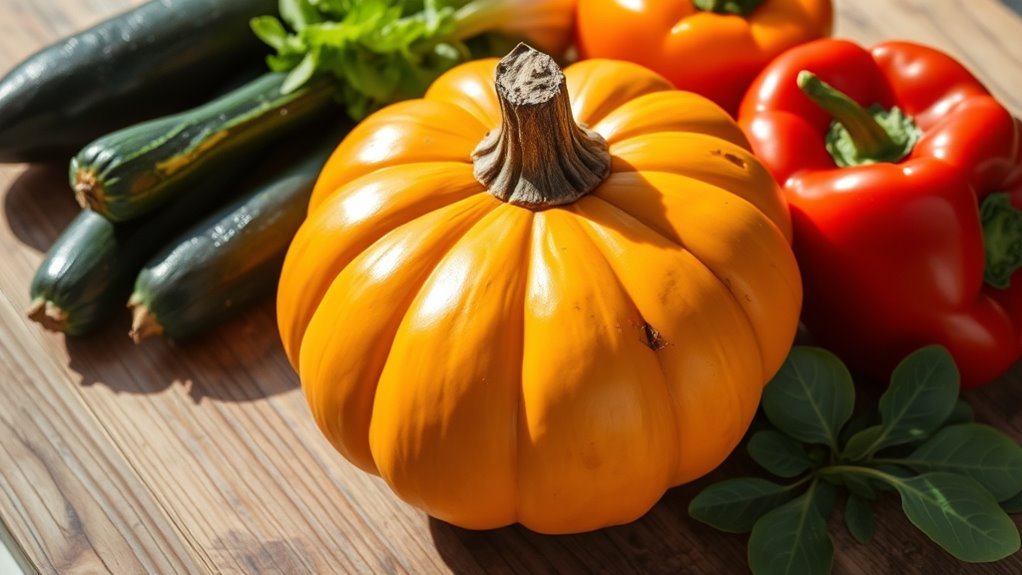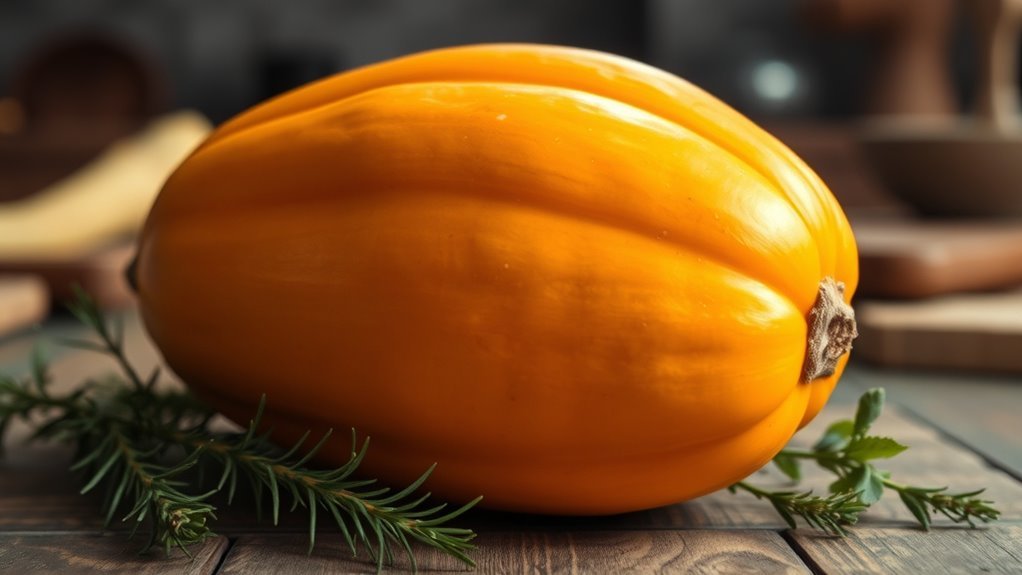Yes, you can have butternut squash on keto, but moderation is key. It has about 12 grams of carbs per cup, so keep an eye on your portion size. The squash is nutrient-dense, offering vitamins A and C, plus fiber. To enjoy it without exceeding your carb limit, consider pairing it with low-carb foods or experimenting with creative recipes like noodles or soups. There’s more to discover about balancing butternut squash with your keto lifestyle.
Nutritional Profile of Butternut Squash

When considering the nutritional profile of butternut squash, it is important to note its rich composition. This vibrant vegetable offers numerous nutritional benefits, including a wealth of vitamins A and C, which support immune function and skin health. Packed with fiber, it promotes digestive health and helps maintain fullness. You can enjoy butternut squash in various cooking methods—roasting, steaming, or blending into soups—each enhancing its natural sweetness and flavor. It’s low in calories yet high in nutrients, making it a versatile addition to your meals. Embracing butternut squash allows you to savor its delicious taste while reaping its health benefits, providing a satisfying way to nourish your body and enjoy culinary freedom.
Carbohydrate Content and Keto Guidelines

Although butternut squash is a nutritious vegetable, its carbohydrate content can pose challenges for those following a ketogenic diet. Understanding the carbohydrate limits of the keto diet is vital for maintaining ketosis. Here are some key points to take into account:
Butternut squash offers nutrition but can challenge ketosis due to its carb content. Understanding your limits is crucial.
- Carbohydrate Count: Butternut squash contains about 12 grams of carbs per cup.
- Serving Size: Portion control is essential; smaller servings can fit into your daily carb allowance.
- Net Carbs: Focus on net carbs (total carbs minus fiber) for a more accurate count.
- Balance: Pair butternut squash with low-carb foods to maintain your overall carb limits. Additionally, the squash’s glycemic index is relatively low, which helps minimize insulin response spikes.
Comparing Butternut Squash to Other Low-Carb Vegetables

Butternut squash is just one of many vegetables you can consider on a ketogenic diet, but it’s crucial to compare it with other low-carb options. While butternut squash contains about 12 grams of carbs per 100 grams, other low-carb vegetables like spinach and zucchini offer considerably fewer carbs, roughly 1-3 grams per serving. These alternatives might help you stay well within your carb limits while still providing essential nutrients. If you’re looking for variety, cauliflower is another excellent choice, with about 5 grams of carbs per 100 grams. Each of these low-carb vegetables brings unique flavors and textures to your meals, so weighing your options can help guarantee you enjoy the freedom of culinary creativity while adhering to your keto lifestyle. Additionally, incorporating leafy greens into your meals can enhance your vitamin intake while keeping your carbohydrate count low.
Creative Ways to Include Butternut Squash in Your Keto Meals
Incorporating butternut squash into your keto meals can be both delicious and satisfying, especially when you explore creative preparation methods. Here are some tasty butternut squash recipes perfect for your keto meal prep:
- Butternut Squash Noodles: Spiralize to create a low-carb alternative to pasta.
- Pureed Soup: Blend roasted squash with coconut milk and spices for a creamy soup.
- Stuffed Squash: Fill roasted halves with seasoned ground meat and cheese for a hearty dish.
- Crispy Chips: Slice thinly, season, and bake for a crunchy snack.
These options not only enhance your meals but also keep your carb count in check while enjoying the flavors and nutrients that butternut squash offers.
Moderation and Balance: Enjoying Butternut Squash on Keto
While enjoying the rich flavors of butternut squash, it is essential to remember that moderation is key on a keto diet. This delicious vegetable can fit into your low-carb lifestyle, but it’s important to practice portion control. A small serving can provide nutrients without greatly impacting your carb intake. Mindful eating plays a critical role here; savor each bite and pay attention to how it makes you feel. By balancing your meals and being conscious of how much butternut squash you include, you can enjoy its taste without derailing your keto goals. Remember, it’s all about finding that sweet spot where you can indulge in flavorful foods while still adhering to your dietary needs. Enjoy freedom in your choices!
Frequently Asked Questions
Can I Eat Butternut Squash Every Day on Keto?
You can eat butternut squash every day on keto, but portion control is key. Did you know that one cup of cooked butternut squash has about 22 grams of carbs? While it offers great nutritional benefits, including vitamins A and C, consuming it daily could impact your carb limits. Balance is essential, so if you enjoy it, consider smaller servings alongside lower-carb veggies to maintain your keto lifestyle without feeling restricted.
What Are the Best Cooking Methods for Butternut Squash?
The best cooking methods for butternut squash include roasting techniques and making soup recipes. Roasting brings out its natural sweetness and enhances flavor, so try cutting it into cubes and tossing with olive oil, salt, and spices before baking. For a comforting dish, blend roasted squash into a creamy soup, adding broth and seasonings. These methods not only preserve nutrients but also allow you to enjoy the squash’s versatility in various meals.
Is Frozen Butternut Squash Keto-Friendly?
Yes, frozen butternut squash can be keto-friendly, but it’s essential to check the nutritional content. Frozen varieties often retain most of the nutrients found in fresh squash, but the carb count can still be significant. A typical cup contains about 15 grams of carbs, which might not fit into a strict keto plan. If you’re mindful of your portion sizes and overall carb intake, you can enjoy it in moderation without guilt.
How Does Butternut Squash Affect Blood Sugar Levels?
Butternut squash has a moderate glycemic index, which means it can cause a gradual increase in blood sugar levels rather than a sharp spike. This can lead to a more stable insulin response, making it a better choice compared to high-GI foods. However, if you’re monitoring your blood sugar closely, it’s wise to consume it in moderation. Balancing it with protein or healthy fats can further mitigate its impact on your blood sugar.
Can Butternut Squash Cause Digestive Issues on Keto?
Butternut squash can cause digestive issues for some people on keto due to its fiber content. While fiber is essential for digestive health, it can lead to bloating or gas, especially if you’re not used to it. If you incorporate butternut squash gradually, you might minimize discomfort. Everyone’s tolerance varies, so listen to your body, and adjust your intake accordingly to maintain a balanced approach to your keto lifestyle.
References
- https://www.ncbi.nlm.nih.gov/pmc/articles/PMC7314741/
- https://www.healthline.com/nutrition/low-carb-diet-foods
- https://www.medicalnewstoday.com/articles/what-is-the-keto-diet
- https://www.verywellfit.com/what-to-eat-on-the-keto-diet-5111620
- https://www.nutrition.gov/topics/whats-food/keto-diet
- https://www.heart.org/en/healthy-living/healthy-eating/eat-smart/nutrition-basics/what-is-the-ketogenic-diet
- https://www.cdc.gov/healthyweight/assessing/bmi/index.html
- https://www.usda.gov/fooddata-nutrition-education


